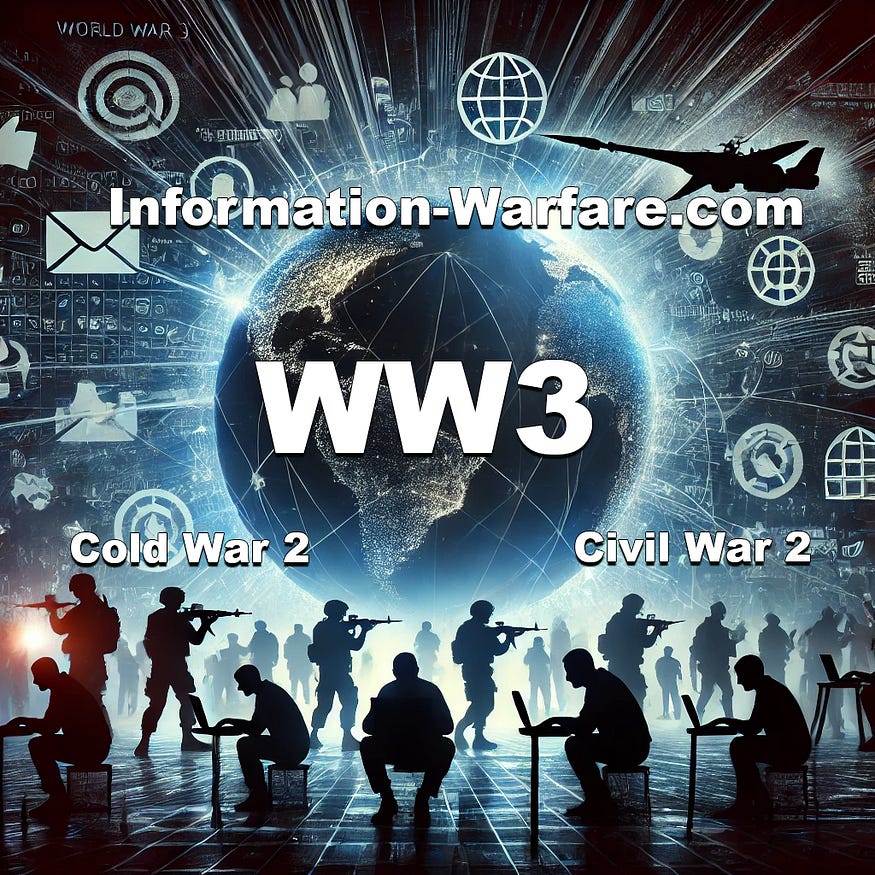World War 3 is an Information War
World War 3 may not involve tanks and missiles but will be fought in the domain of information

In the modern era, the nature of warfare has dramatically shifted. The rise of the internet, social media, and digital communication has transformed the battlefield from physical terrains to the realm of information. As geopolitical tensions rise, it becomes increasingly clear that World War 3 is an information war, where the control, manipulation, and dissemination of information play a critical role.
The Digital Battlefield
Information warfare involves using digital platforms to influence public opinion, disrupt societal norms, and destabilize political environments. Unlike traditional warfare, where physical combat determines the outcome, information warfare leverages cyber attacks, disinformation campaigns, propaganda, and psychological operations to achieve strategic goals.
Key Components of Information Warfare
Cyber Attacks: These are designed to infiltrate, disrupt, or damage critical infrastructure, steal sensitive data, or disable essential services. Examples include the 2017 WannaCry ransomware attack and the 2020 SolarWinds hack.
Disinformation Campaigns: The spread of false or misleading information to deceive or confuse the public. Notable instances include the misinformation around COVID-19 vaccines and the Russian interference in the 2016 U.S. elections.
Propaganda: Information, often biased or misleading, used to promote a particular political cause or point of view. Governments and organizations use social media to spread propaganda to influence public opinion on a massive scale.
Psychological Operations (PSYOPs): Tactics designed to influence the attitudes and behaviors of populations. These can include fake news, deepfakes, and manipulated media to create confusion and distrust.
The Role of Social Media
Social media platforms are at the forefront of this new form of warfare. They allow for the rapid dissemination of information and are often used to spread disinformation and propaganda. Algorithms on these platforms tend to prioritize sensational content, which can amplify false narratives and further polarize societies.
The Impact on Society
Information warfare has profound implications for global stability and democracy. It can undermine trust in institutions, disrupt elections, incite violence, and create widespread panic. The ability to manipulate information on a large scale poses a significant threat to national security and global peace.
Examples of Information Warfare
Russian Disinformation Campaigns: Russia has been actively involved in spreading disinformation to influence political outcomes in other countries. The 2016 U.S. presidential election is a prime example where Russian operatives used social media to spread divisive content.
COVID-19 Misinformation: During the pandemic, various actors spread false information about the virus, vaccines, and treatments, leading to confusion and mistrust in public health measures.
China’s Influence Operations: China has been accused of using information warfare to shape global narratives, particularly concerning its policies and actions in Hong Kong, Taiwan, and the South China Sea.
Conclusion
As the lines between truth and falsehood blur in the digital age, recognizing and countering information warfare is crucial. World War 3 may not involve tanks and missiles but will be fought in the domain of information, where the control of narratives can determine the fate of nations. It is imperative for governments, technology companies, and individuals to work together to safeguard the integrity of information and protect democratic values in this ongoing battle.
The future of global stability hinges on our ability to navigate and counter the threats posed by information warfare.

